15-16学年译林牛津版高二(上)课件:模块五 Unit 1 Getting along with others Project(共33张PPT)
文档属性
| 名称 | 15-16学年译林牛津版高二(上)课件:模块五 Unit 1 Getting along with others Project(共33张PPT) |

|
|
| 格式 | zip | ||
| 文件大小 | 468.0KB | ||
| 资源类型 | 教案 | ||
| 版本资源 | 牛津译林版 | ||
| 科目 | 英语 | ||
| 更新时间 | 2015-08-19 00:00:00 | ||
图片预览

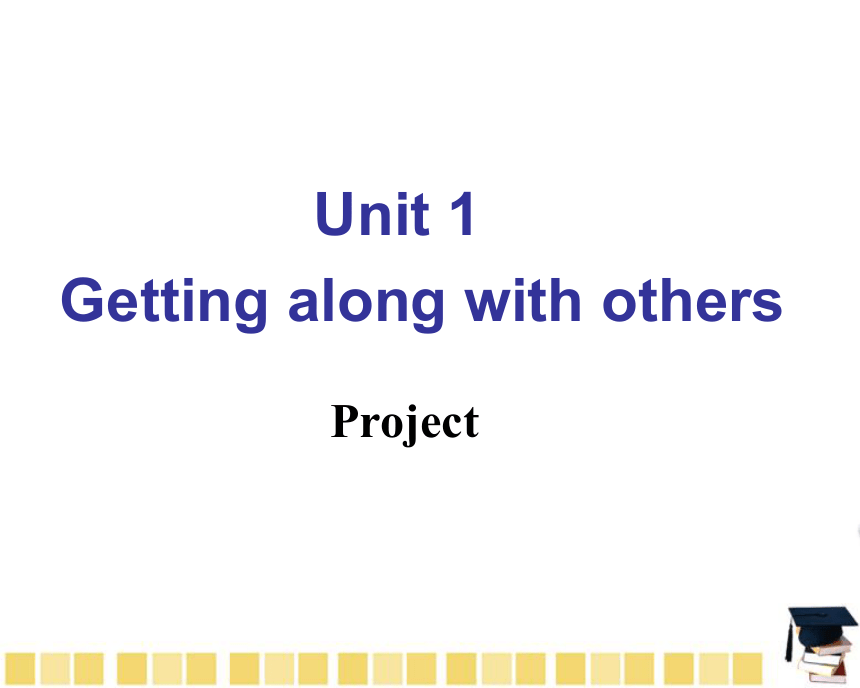

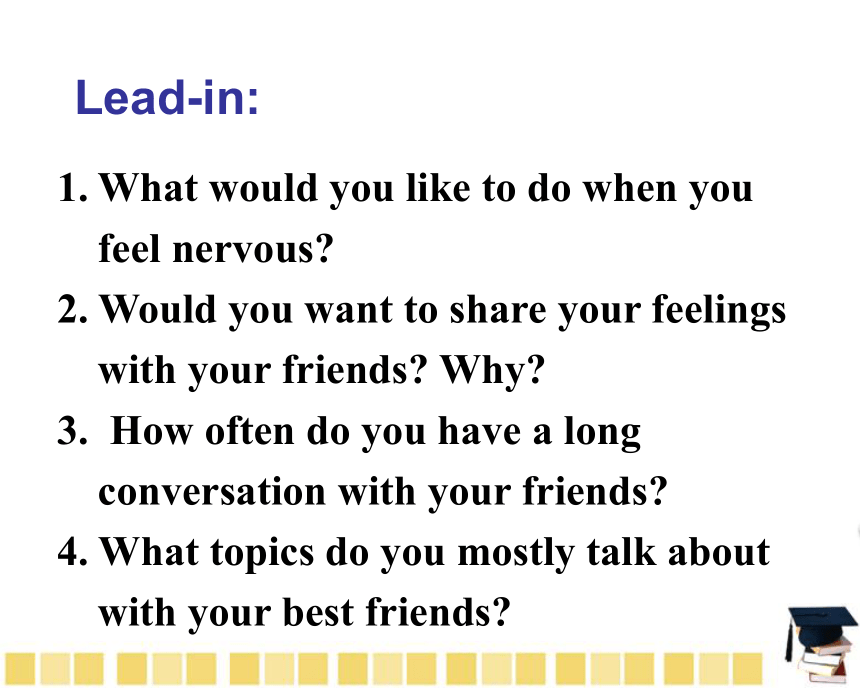
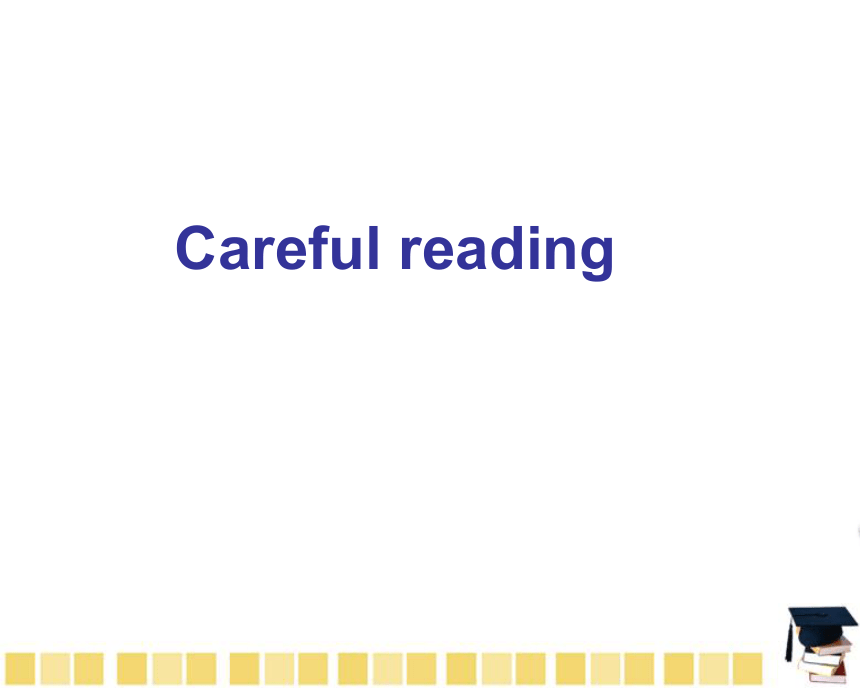
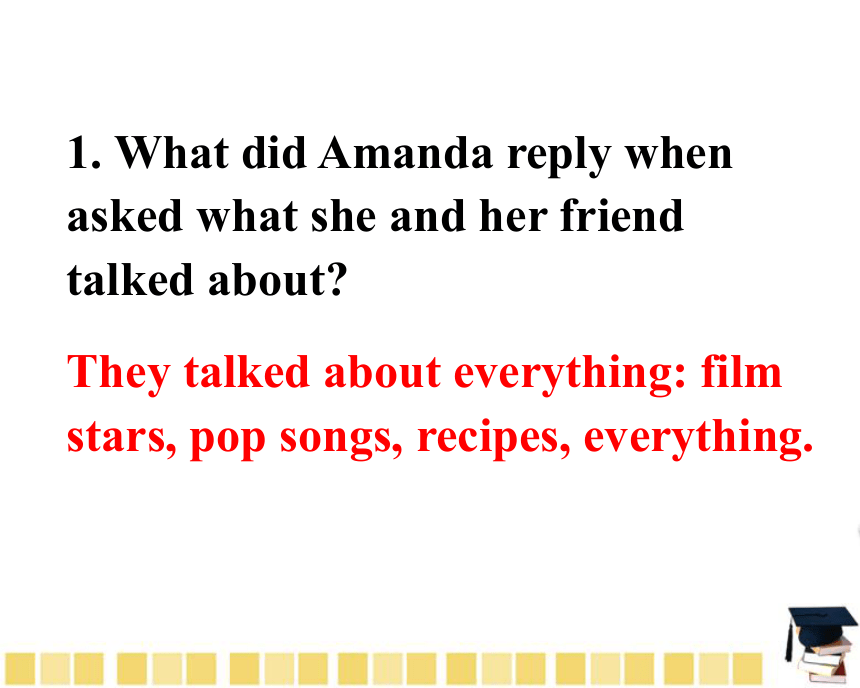
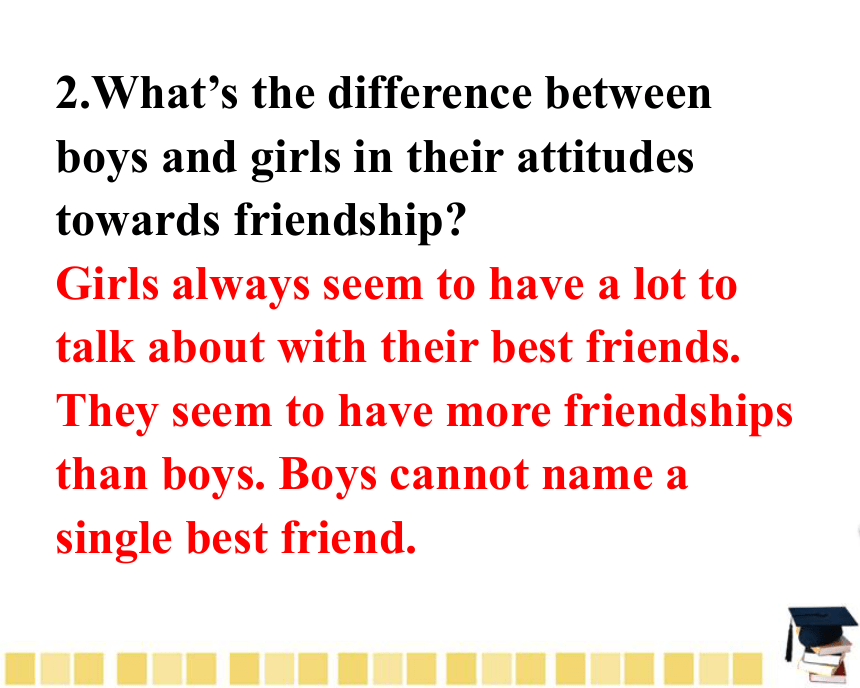

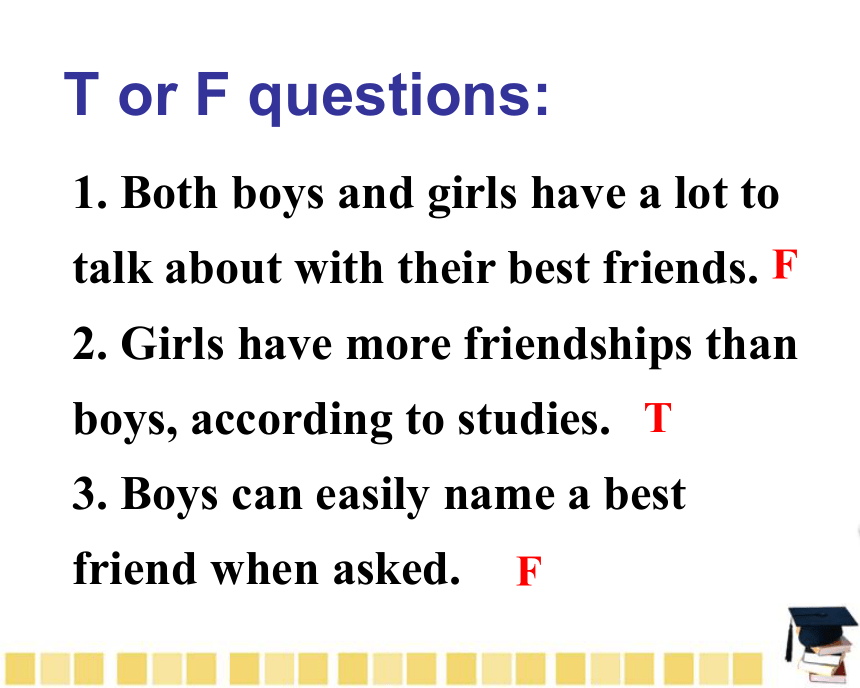

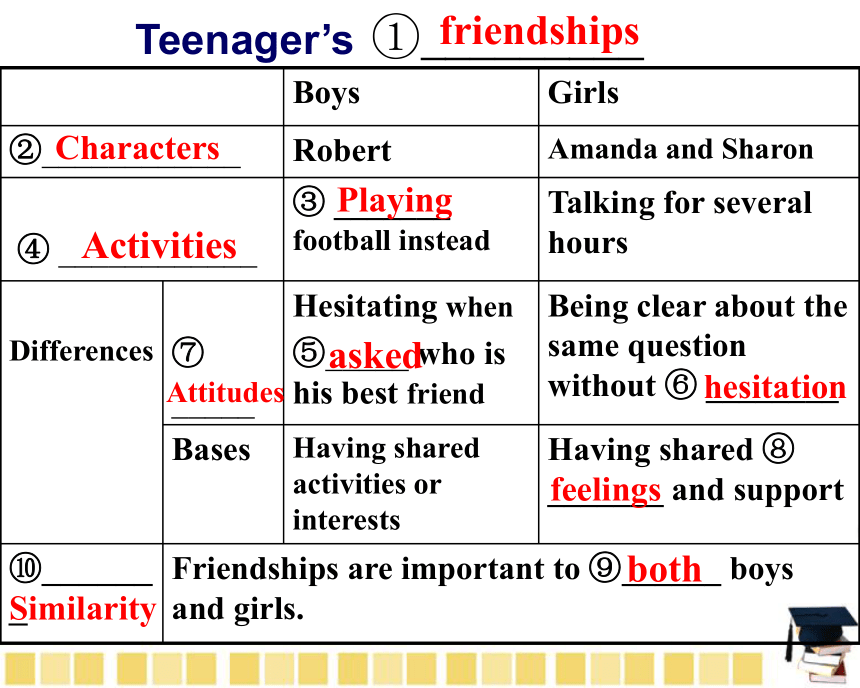
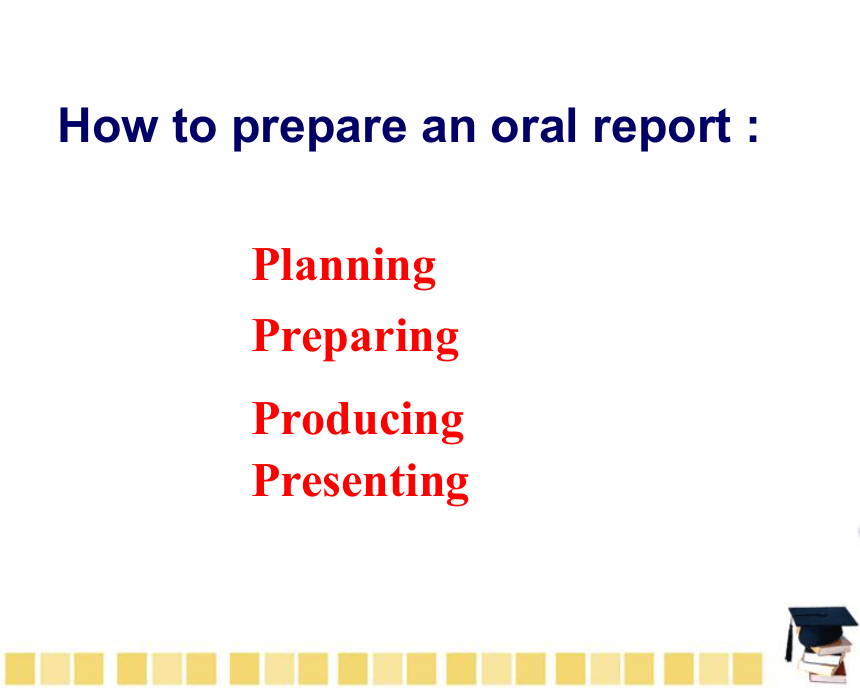
文档简介
课件33张PPT。Project Unit 1
Getting along with othersTeenagers’ friendshipsWhat would you like to do when you feel nervous?
2. Would you want to share your feelings with your friends? Why?
3. How often do you have a long conversation with your friends?
4. What topics do you mostly talk about with your best friends?Lead-in:Careful reading1. What did Amanda reply when asked what she and her friend talked about?
They talked about everything: film stars, pop songs, recipes, everything.
2.What’s the difference between boys and girls in their attitudes towards friendship?
Girls always seem to have a lot to talk about with their best friends. They seem to have more friendships than boys. Boys cannot name a single best friend.
3. Why can’t boys name a single best friend?
Because they are busy with homework and have so many friends that it is hard for them to choose.T or F questions:1. Both boys and girls have a lot to talk about with their best friends.
2. Girls have more friendships than boys, according to studies.
3. Boys can easily name a best friend when asked.FTF4. If a boy is said to have a best friend, it seems that they share much about their feelings.
5. A girl’s best friend might be the first to tell her about something good or bad that has happened in her life.FTTeenager’s ①_________friendshipsCharacters ActivitiesPlayingAttitudesfeelingsbothSimilarityaskedhesitationPlanningPreparingProducingPresentingHow to prepare an oral report : Planning
Work in small groups and survey people to determine how attitudes between boys and girls differ on a certain topic. All the group members should agree on the topic you choose.Preparing
Now that you have chosen your topic, your group will need to discuss and agree on an answer to each of the following questions:
What is the primary purpose of your survey?
Who will you choose to survey?
How will you design your survey?
How many questions will you ask?Who will write the survey questions?
Who will work out the results?
Who will write the report?
Who will present the oral report?
Producing
Some group members write multiple choice questions.
Some conduct the survey and
calculate the results.
Some write the final analysis. Last,
write your conclusions based on the survey results. Presenting
Now it’s time to present your findings to the class in an oral report and prepare to answer any questions your classmates have about your survey or result.Language points absorb: “吸收”“全神贯注”,可与介词in搭配,构成be absorbed in 结构。
The boy sat there, absorbed in
thought.
那个男孩坐在那里,沉思着。
I was absorbed in a book and didn’t hear you at all.
我正专心看书,没听到你叫我。 absorb: to take sth. in, especially
gradually: Dark surfaces absorb more heat from the sun.
深色的物体表面能从太阳吸收更多的热量。
Plants absorb carbon dioxide.
植物吸收二氧化碳。 About nine tenths of the light from the sun is absorbed by the atmosphere.
来自太阳的光约有十分之九被大气层吸收。 absorb: to understand facts or ideas
completely and remember them: It’s hard to absorb so much information.
很难一下接受这么多的信息。
The clever boy absorbed all the knowledge his teacher could give him.
那个聪明的男孩吸收了老师教给他的所有知识。 Water can absorb and give off a lot of heat without big changes in temperature, thus creating a _______ environment.
(2007湖北)
A. peaceful B. sensitive
C. common D. stable 高考链接:D digest: to change food in your stomach into substances that your body can use
指消化吸收,也可引申为对其他东西的吸收,比absorb 语气强。
Cheese doesn’t digest easily.
奶酪不容易吸收。
This chapter is so difficult to digest, I
shall have to read it again later.
这一节很难消化,我以后还要再读一
遍。 take in 表示“吸收成员”“收留”“领会”“欺骗”等。
We plan to take in more party members.
我们计划吸收更多的新党员。
He had nowhere to live, so we took him in.
他没地方住,因此我们收留了他。 I didn’t take in what you were saying.
我没领会你当时说的话。
They were completely taken in by his story.
他们完全被他编造的故事欺骗了。 Regardless of what these friendships are based upon, shared feelings or activities, the important thing to remember is that both of them are friendships.
regardless: adv. despite; not being affected by sth. “不顾”“不管” She knew it was dangerous to visit him, but she set out regardless (of the risk).
尽管她知道去看他是很危险的,但她还是去了。
He says what he thinks, regardless of other people’s feelings.
他想到什么就说什么,毫不考虑别人的感受。
All our proposals were rejected regardless of their merits.
我们所有的建议都遭到了拒绝,不管它们的价值如何。Test yourself He went out ___ the heavy rain.
A. although B. anyhow
C. regardless of D. nevertheless CHomeworkOne true friend is better than 100
acquaintances (A person whom
one knows but who is not a close
friend.)
Do you think so? Why? Please give
an oral report.Thank you !
Getting along with othersTeenagers’ friendshipsWhat would you like to do when you feel nervous?
2. Would you want to share your feelings with your friends? Why?
3. How often do you have a long conversation with your friends?
4. What topics do you mostly talk about with your best friends?Lead-in:Careful reading1. What did Amanda reply when asked what she and her friend talked about?
They talked about everything: film stars, pop songs, recipes, everything.
2.What’s the difference between boys and girls in their attitudes towards friendship?
Girls always seem to have a lot to talk about with their best friends. They seem to have more friendships than boys. Boys cannot name a single best friend.
3. Why can’t boys name a single best friend?
Because they are busy with homework and have so many friends that it is hard for them to choose.T or F questions:1. Both boys and girls have a lot to talk about with their best friends.
2. Girls have more friendships than boys, according to studies.
3. Boys can easily name a best friend when asked.FTF4. If a boy is said to have a best friend, it seems that they share much about their feelings.
5. A girl’s best friend might be the first to tell her about something good or bad that has happened in her life.FTTeenager’s ①_________friendshipsCharacters ActivitiesPlayingAttitudesfeelingsbothSimilarityaskedhesitationPlanningPreparingProducingPresentingHow to prepare an oral report : Planning
Work in small groups and survey people to determine how attitudes between boys and girls differ on a certain topic. All the group members should agree on the topic you choose.Preparing
Now that you have chosen your topic, your group will need to discuss and agree on an answer to each of the following questions:
What is the primary purpose of your survey?
Who will you choose to survey?
How will you design your survey?
How many questions will you ask?Who will write the survey questions?
Who will work out the results?
Who will write the report?
Who will present the oral report?
Producing
Some group members write multiple choice questions.
Some conduct the survey and
calculate the results.
Some write the final analysis. Last,
write your conclusions based on the survey results. Presenting
Now it’s time to present your findings to the class in an oral report and prepare to answer any questions your classmates have about your survey or result.Language points absorb: “吸收”“全神贯注”,可与介词in搭配,构成be absorbed in 结构。
The boy sat there, absorbed in
thought.
那个男孩坐在那里,沉思着。
I was absorbed in a book and didn’t hear you at all.
我正专心看书,没听到你叫我。 absorb: to take sth. in, especially
gradually: Dark surfaces absorb more heat from the sun.
深色的物体表面能从太阳吸收更多的热量。
Plants absorb carbon dioxide.
植物吸收二氧化碳。 About nine tenths of the light from the sun is absorbed by the atmosphere.
来自太阳的光约有十分之九被大气层吸收。 absorb: to understand facts or ideas
completely and remember them: It’s hard to absorb so much information.
很难一下接受这么多的信息。
The clever boy absorbed all the knowledge his teacher could give him.
那个聪明的男孩吸收了老师教给他的所有知识。 Water can absorb and give off a lot of heat without big changes in temperature, thus creating a _______ environment.
(2007湖北)
A. peaceful B. sensitive
C. common D. stable 高考链接:D digest: to change food in your stomach into substances that your body can use
指消化吸收,也可引申为对其他东西的吸收,比absorb 语气强。
Cheese doesn’t digest easily.
奶酪不容易吸收。
This chapter is so difficult to digest, I
shall have to read it again later.
这一节很难消化,我以后还要再读一
遍。 take in 表示“吸收成员”“收留”“领会”“欺骗”等。
We plan to take in more party members.
我们计划吸收更多的新党员。
He had nowhere to live, so we took him in.
他没地方住,因此我们收留了他。 I didn’t take in what you were saying.
我没领会你当时说的话。
They were completely taken in by his story.
他们完全被他编造的故事欺骗了。 Regardless of what these friendships are based upon, shared feelings or activities, the important thing to remember is that both of them are friendships.
regardless: adv. despite; not being affected by sth. “不顾”“不管” She knew it was dangerous to visit him, but she set out regardless (of the risk).
尽管她知道去看他是很危险的,但她还是去了。
He says what he thinks, regardless of other people’s feelings.
他想到什么就说什么,毫不考虑别人的感受。
All our proposals were rejected regardless of their merits.
我们所有的建议都遭到了拒绝,不管它们的价值如何。Test yourself He went out ___ the heavy rain.
A. although B. anyhow
C. regardless of D. nevertheless CHomeworkOne true friend is better than 100
acquaintances (A person whom
one knows but who is not a close
friend.)
Do you think so? Why? Please give
an oral report.Thank you !
